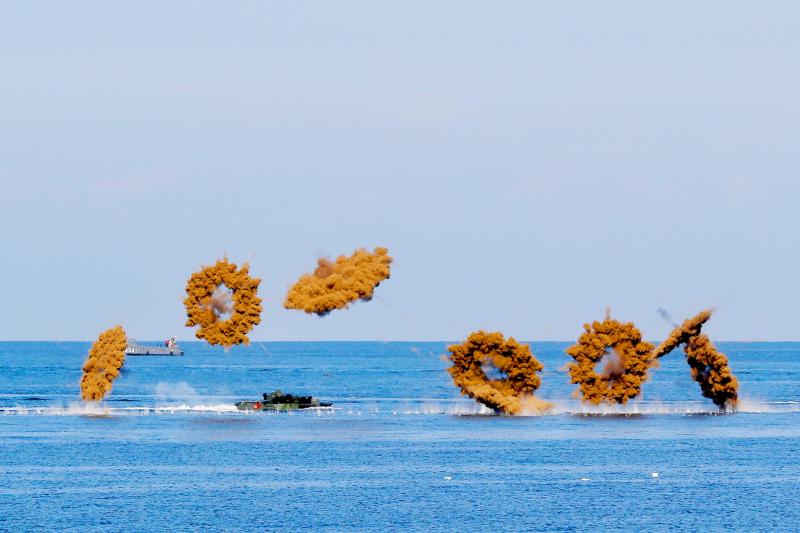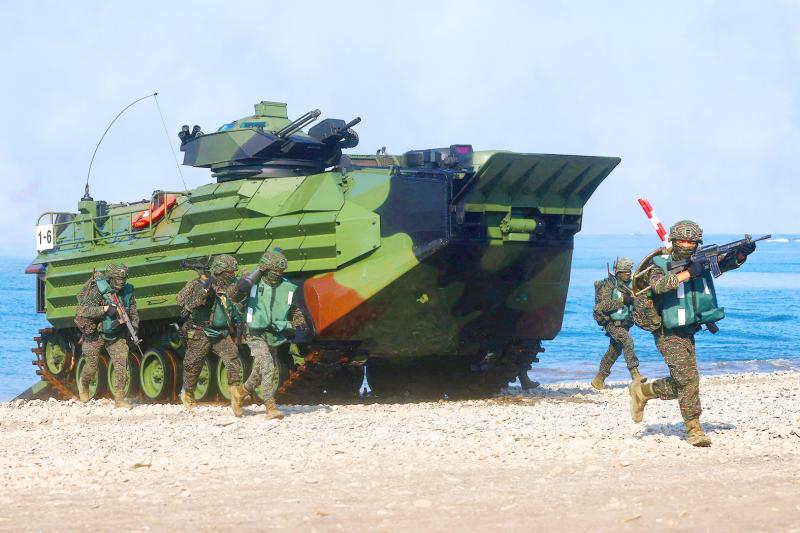The military yesterday deployed a drone and several vehicles to drop leaflets and broadcast messages in a psychological warfare drill as part of the Han Kuang exercises.
During the drill in Taoyuan, a psychological warfare task force from the Political Warfare Bureau dispatched a drone to scatter leaflets, while trucks broadcast video and audio propaganda to boost the morale of Taiwanese soldiers amid a simulation of an invasion by China.
A military truck blared sound effects of fighter jets flying by, shells dropping and tanks rolling, a strategy to distract and confuse the enemy on the battlefield, the Ministry of National Defense said.

Photo: RITCHIE B. TONGO, EPA-EFE
Cognitive warfare, disinformation campaigns and rumor-spreading have become a major part of modern warfare, alongside conventional kinetic warfare, the ministry said.
The main purpose of psychological warfare is to counter such campaigns and create fear among the enemy, thus weakening its will to fight, it said.
The bureau’s special task force is capable of creating and broadcasting audio and video propaganda material, and dropping flyers within 30 minutes of receiving an order to do so, the ministry said.

Photo: Ann Wang,
Yesterday’s drill’s were part of the live-fire component of the 38th edition of the annual Han Kuang exercises.
The exercises, which test the country’s combat readiness in the event of a Chinese invasion, began on Monday morning and are to conclude today.
In other Han Kuang drills yesterday, the 99th Marine Brigade held a joint landing operation at a beach in Pingtung County’s Fangshan Township (枋山).
Using boats and amphibious assault vehicles, special troops made a landing at the beach, covered by friendly air and sea forces, the ministry said.
In Miaoli County, reservists undergoing extended training under the 302nd Infantry Brigade simulated fending off an attempted beach landing by enemy forces.
CM34 and CM32 armored vehicles from the 586 Armored Brigade were deployed to repel the “invaders.”

Taiwan has received more than US$70 million in royalties as of the end of last year from developing the F-16V jet as countries worldwide purchase or upgrade to this popular model, government and military officials said on Saturday. Taiwan funded the development of the F-16V jet and ended up the sole investor as other countries withdrew from the program. Now the F-16V is increasingly popular and countries must pay Taiwan a percentage in royalties when they purchase new F-16V aircraft or upgrade older F-16 models. The next five years are expected to be the peak for these royalties, with Taiwan potentially earning

STAY IN YOUR LANE: As the US and Israel attack Iran, the ministry has warned China not to overstep by including Taiwanese citizens in its evacuation orders The Ministry of Foreign Affairs (MOFA) yesterday rebuked a statement by China’s embassy in Israel that it would evacuate Taiwanese holders of Chinese travel documents from Israel amid the latter’s escalating conflict with Iran. Tensions have risen across the Middle East in the wake of US and Israeli airstrikes on Iran beginning Saturday. China subsequently issued an evacuation notice for its citizens. In a news release, the Chinese embassy in Israel said holders of “Taiwan compatriot permits (台胞證)” issued to Taiwanese nationals by Chinese authorities for travel to China — could register for evacuation to Egypt. In Taipei, the ministry yesterday said Taiwan

‘LIKE-MINDED PARTNER’: Tako van Popta said it would be inappropriate to delay signing the deal with Taiwan because of China, adding he would promote the issue Canadian senators have stressed Taiwan’s importance for international trade and expressed enthusiasm for ensuring the Taiwan-Canada trade cooperation framework agreement is implemented this year. Representative to Canada Harry Tseng (曾厚仁) in an interview with the Central News Agency (CNA) said he was increasingly uneasy about Ottawa’s delays in signing the agreement, especially as Ottawa has warmed toward Beijing. There are “no negotiations left. Not only [is it] initialed, we have three versions of the text ready: English, French and Mandarin,” Tseng said. “That tells you how close we are to the final signature.” Tseng said that he hoped Canadian Prime Minister Mark Carney

POSITIVE DEVELOPMENT: Japan and the US are expected to hold in-depth discussions on Taiwan-related issues during the meeting next month, Japanese sources said The holding of a Japan-US leaders’ meeting ahead of US President Donald Trump’s visit to China is positive news for Taiwan, former Japan-Taiwan Exchange Association representative Hiroyasu Izumi said yesterday. After the Liberal Democratic Party’s landslide victory in Japan’s House of Representatives election, Japanese Prime Minister Sanae Takaichi is scheduled to visit the US next month, where she is to meet with Trump ahead of the US president’s planned visit to China from March 31 to April 2 for a meeting with Chinese President Xi Jinping (習近平). Japan and the US are expected to hold in-depth discussions on Taiwan-related issues during the